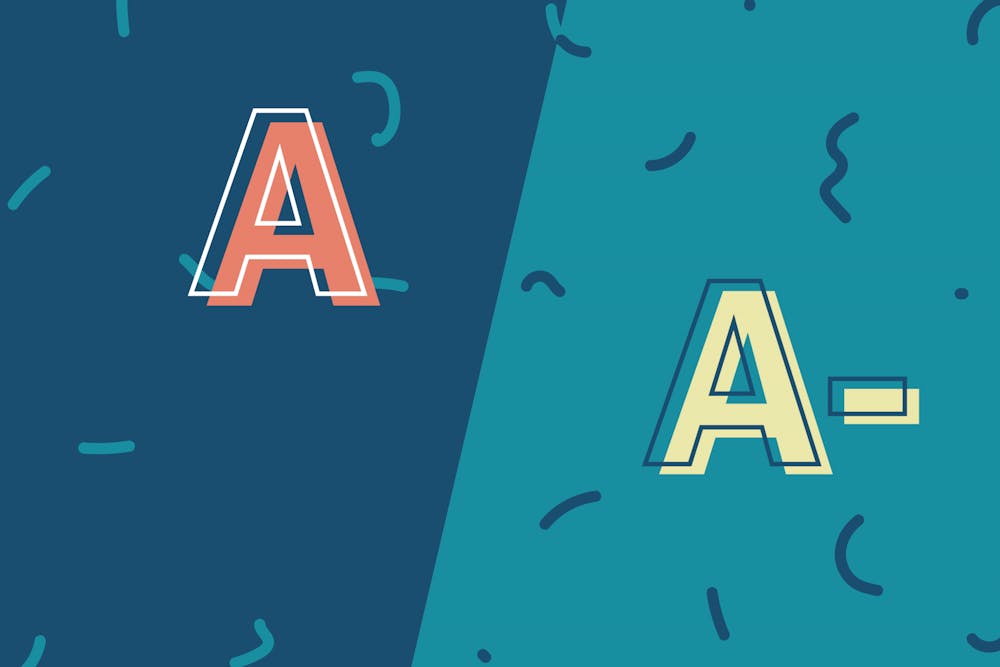
With the semester coming to a rough end, it has been evident to many that Penn has failed to create an inclusive grading policy in times of academic and emotional need. With the significant potential of the fall 2020 semester ending up online as well, we as a student body need to acknowledge our unmet needs to the administration. Although there has been traction to carry out a universal pass/fail, this policy would, in reality, accommodate the needs of Penn students less. As a result, the only reasonable way to provide academic and emotional relief to everyone who needs it is by implementing a double-A (guaranteed A or A-) or double-A/fail (guaranteed A or A- if the course is not failed) policy.
The two most important aspects that need to be fulfilled in order to accommodate all Penn undergraduates are to allow the option to have letter grades and to mitigate the effects of circumstantial inequality. The best way to approach this problem is by having a Double-A grading policy, in which students are guaranteed an A-, or a double-A/fail policy, in which passing a course awards at least an A-.
The current grading policy adopted by the University inherently marginalizes students planning to attend graduate school as it requires them to opt-in order to partake in the pass/fail system. Students attend college to receive a diploma and a GPA in order to show academic achievement to an employer or another institution, and it is no different at Penn. It is shamelessly detrimental for these students to be deprived the access to receiving a letter grade for classes paid for in order to receive assistance because it is evident that students planning to attend graduate school are still facing the same excruciating circumstances.
The lack of external GPA support in difficult times especially hinders the success of students who have been directly affected by the COVID-19 outbreak, first-generation low-income and non-FGLI alike. As you’re reading this, some of us have come home to unreliable Internet access, to a complete lack of personal space, to immunocompromised family members whose lives are at risk, to unemployed parents, and to families awaiting bankruptcy.
Many believe that a mandatory pass/fail grading policy is the most effective. However, this would eliminate letter grades, which would be unfair for many students. Although this type of policy would ease the transition into online learning during an outbreak for many students, it would also be taking away the freedom of choice. Lastly, a mandatory pass/fail policy would create a lack of motivation and depreciate the quality of education.
Unfortunately, the current grade policy further alienates affected students’ achievement. Due to the distinct culture found at Penn that is hard to adjust to, it is a common trend to see FGLI students struggle in their first few semesters. By disregarding up to potentially two semesters worth of their time at Penn for a non-inclusive pass/fail policy, Penn would be denying the opportunity of FGLI students achieving academically.
When prioritizing the opportunity to have letter grades and minimizing inequality, the only accepting grading policy is the double-A or double-A/fail grading system, in which students can receive an A-/A if they pass the course.
Some are concerned with a grading policy that creates an equivalence with an A or A- with passing in regards to grade inflation and student motivation. Given the policy would only be possibly implemented for the fall semester, the grade inflation would be negligible at best. Furthermore, students would still be motivated to obtain a higher A, as opposed to a pass/fail system where it is all or nothing. It can be guaranteed that there would be Penn students complaining about receiving an A- in a class under this policy.
As of now, the situation for the fall 2020 semester is still quite uncertain. If the time does come where we have to spend the next semester off-campus as well, then it is crucial that representative campus organizations take the correct stance and garner the administration’s attention.
JOHAER JILANI is a College freshman from Atlanta, Ga. studying Neuroscience. His email address is johaer@sas.upenn.edu.
The Daily Pennsylvanian is an independent, student-run newspaper. Please consider making a donation to support the coverage that shapes the University. Your generosity ensures a future of strong journalism at Penn.
Donate







